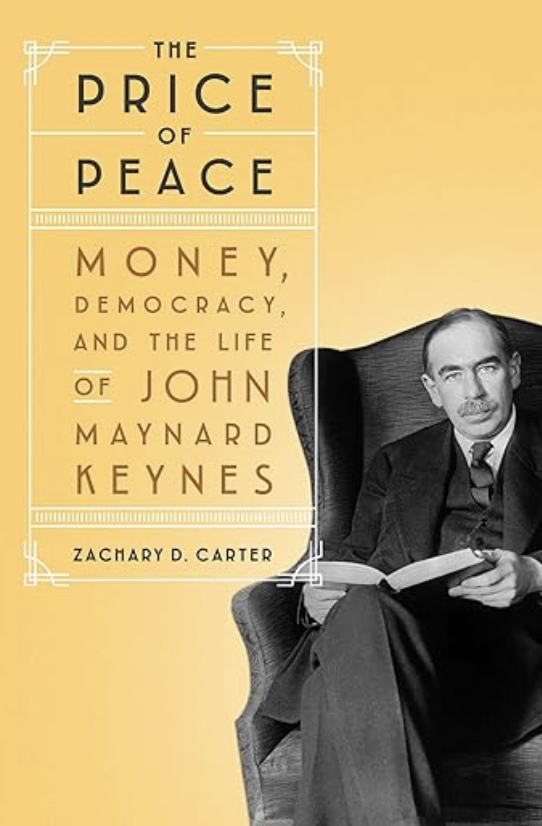Gold: a refuge from empty promises to pay
There are certain names that echo down from the history of finance and economics.
Adam Smith is one. Milton Friedman is another.
So does the British economist John Maynard Keynes.
Keynes’ was, and famously remains, an advocate of government deficit spending in a recession.
It’s hard to imagine now how radical this position was in the decade before the Second World War.
Governments were expected to balance their books according to the orthodoxy of the time.
You might not have read Keynes’s work, but it doesn’t matter for today’s discussion.
You’re literally living in the economy he envisioned.
Well, sort of, anyway.
Why do you care?
We’ll get to that shortly.
I have Keynes on the brain because recently I read the following book…

If you’re a history buff like me, you’ll love it. The other 95% of you will likely prefer to give it a miss.
I bring it up for a particular reason. Keynes’ most famous work is The General Theory of Employment, Interest and Money.
That came out in 1936.
That’s where he put down his ideas on how governments could lift their domestic economies out of a slump.
However…
Keynes was globally famous long before that came out and long before the Great Depression gripped the world.
He shot from obscurity, actually, in 1919.
That’s when he wrote a scorching book eviscerating the Treaty of Versailles.
It was called The Economic Consequence of the Peace.
Let me give you some context…because something similar is playing out today.
The European nations had just spent the previous four years smashing each other to smithereens on the Western and Eastern fronts of the First World War.
Both sides resorted to massive inflation to pay the expenses of the war.
Both sides also carried massive government debts as a hangover of that same spending.
Now came the financial reckoning — and the social consequences.
You might know a little about this already. If not, you only need the gist.
The Allies blamed the war on Germany.
They used the Treaty of Versailles to claim German colonies and some of its European territory.
They also took some of its industrial plant and left Germany with a massive reparations bill for current and future workers to pay off.
Part of it was revenge. Part of it was politics.
Keynes pointed out that, worst of all, it was stupid.
Germany didn’t have a hope of footing the monstrous bill the Allies left it with. The economy and the workforce were shattered.
The only way Germany could even pretend to pay would be to impose massive austerity on her people.
They did, and eventually, it helped bring Hitler to power.
But, for today, it’s more important to know that the war left a circle of credits and debts that went something like this:
The British and the French owed the US billions they borrowed during the war.
The only way they could pay the Americans was to bleed Germany, Austria, and Italy for reparations.
But none of these economies could reconstruct their societies and trade, plus carry such a massive burden of debt and interest.
Keynes advocated for the US to forgive the British and French debts, and they, in turn, could forgive the German ones.
The US would not do this.
What happened instead, in a convoluted way, was this…
‘The United States…loaned money to Germany, which turned it over to France and Great Britain in the form of reparations, which sent it back to the United States in payments on war debts, enabling the cycle to begin again.
‘It was a fragile system, but it worked — as long as Germany could keep getting foreign loans.’
The Price of Peace,
Zachary D Carter
In other words, the global economy of the time was kept running on an unsustainable cycle of debt.
It broke down after 1929 when US money stopped flowing into Germany. And along came the Great Depression.
The reason Keynes raged against this is that, from the very beginning, it was obvious that Germany could not pay its debts because of the austerity the Treaty imposed on its economy.
The Treaty of Versailles was a charade as a workable solution.
However, political leaders around the world ignored this obvious truth and acted as if there would be no consequences.
That brings us to today.
Few remember or even study history.
Right in front of us, we have another unsustainable cycle of debt ratcheting ever higher.
It’s called the US federal debt.
It’s now more than US$30 trillion and growing every second, every minute and every hour.
The Economist reports:
“For the past five years, under first Donald Trump and then Joe Biden, the federal deficit has averaged 9% of GDP a year. The International Monetary Fund says that America’s borrowing is so vast it is endangering global financial stability.”
In other words, the US budget and solvency look like the same train wreck Germany did in 1923.
The only thing keeping the US afloat is the central banks juicing the system with newly created money (‘liquidity’).
Why do you care?
It’s as close as a slam dunk as you get in the financial world that the Fed returns to quantitative easing (QE) in the near future to finance the US government.
In other words, if you were a German in 1923, you wanted to own gold and other hard assets because the only way ahead for the country was to inflate.
The logic of the debt loop they were in demanded no other choice.
And that’s what they did.
The same is true today. US debt and deficits are so large now it’s impossible for them to run a balanced set of books.
They can’t tax their way back to health without crushing their economy.
That means more Fed money printing, which, in turn, will feed into gold and, if I’m right, bitcoin.
People can see perfectly well that the current currency system has one foot above an open manhole and another about to step on a banana peel.
Investors will seek refuge in anything that can’t be created out of thin air, like US dollars, British pounds, and Japanese yen.
That puts gold, bitcoin, property, and other hard assets on the shopping list of the world’s money managers.
Keynes could see the Treaty of Versailles for the madness it was in 1919, even if the political elite wouldn’t admit it.
We can see the US government finances for the madness they are, even if today seems a lot like yesterday, and so, probably, will tomorrow.
But one day, likely in the next decade, the 21st century is going to get its 1929 moment when the debt merry-go-round turns off.
We don’t know when it’s coming, only that the prudent investor should prepare for it. My suggestion? Accumulate gold stocks over time.
For more investment ideas and analysis, be sure to subscribe to Fat Tail Daily.
Best wishes,
Callum Newman
Fat Tail Investment Research
1 topic

